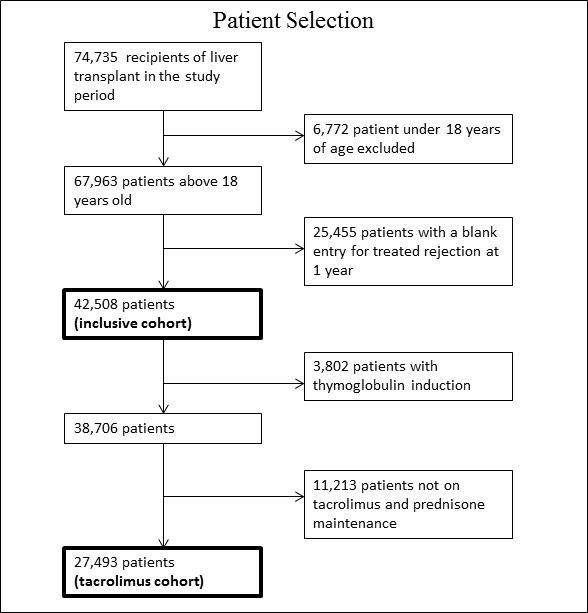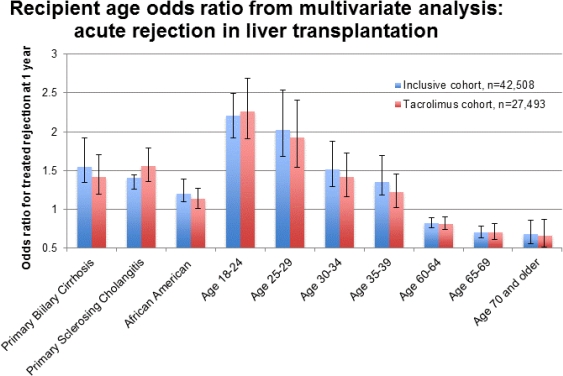Profiling Immunologic Risk for Acute Rejection in Liver Transplantation: Recipient Age Is a Robust Risk Factor.
Surgery, Division of Abdominal Transplantation and Hepatobiliary Surgery, Balyor College of Medicine, Houston, TX.
Meeting: 2016 American Transplant Congress
Abstract number: 142
Keywords: Age factors, Immunosuppression, Liver, Rejection
Session Information
Session Name: Concurrent Session: Liver: Immunosuppression and Rejection
Session Type: Concurrent Session
Date: Sunday, June 12, 2016
Session Time: 4:30pm-6:00pm
 Presentation Time: 5:06pm-5:18pm
Presentation Time: 5:06pm-5:18pm
Location: Room 312
Profiling the immunologic risk for acute rejection in liver transplantation (OLT) may allow for selection immunosuppression (IS) target ranges appropriate to risk levels, all with the goal to minimize unnecessary IS. We aimed to identify risk factors for acute rejection in OLT with the hopes of creating a schema for assisting clinical judgment.
Using registry data from the Organ Procurement and Transplantation Network, we identified 42,508 adult recipients who underwent OLT between 2002 and 2013. We excluded recipients with a blank entry for treated rejection (yes/no). We analyzed this all-inclusive cohort in addition to a subset of 27,493 patients with just tacrolimus maintenance IS. We performed univariate and multivariate logistic regression analyses on both cohorts and identified independent risk factors for treated acute rejection at one year.
Recipient age showed a dose-dependent effect on risk of acute rejection. The strongest risk factors for treated rejection at one year were: age 18-25, OR 2.20 (1.91-2.53); age 26-29, OR 2.03 (1.69-2.44), and primary biliary cholangitis, OR 1.55 (1.35-1.79). The most protective factors were age 70 and older, OR 0.68 (0.55-0.84) and age 65-69, OR 0.70 (0.62-0.78).
Although prior studies have suggested age as a risk factor for rejection in OLT, this is the first study of national-level data to demonstrate a robust dose-dependent relationship between age and risk for rejection at one year. This analysis shows that regardless of IS regimen, recipient age is a dominant risk factor for acute rejection in liver transplantation. Clinicians should place significant weight on recipient age when they profile their recipients for the immunologic risk of rejection.
CITATION INFORMATION: Kueht M, Cotton R, O'Mahony C, Goss J, Rana A. Profiling Immunologic Risk for Acute Rejection in Liver Transplantation: Recipient Age Is a Robust Risk Factor. Am J Transplant. 2016;16 (suppl 3).
To cite this abstract in AMA style:
Kueht M, Cotton R, O'Mahony C, Goss J, Rana A. Profiling Immunologic Risk for Acute Rejection in Liver Transplantation: Recipient Age Is a Robust Risk Factor. [abstract]. Am J Transplant. 2016; 16 (suppl 3). https://atcmeetingabstracts.com/abstract/profiling-immunologic-risk-for-acute-rejection-in-liver-transplantation-recipient-age-is-a-robust-risk-factor/. Accessed February 18, 2026.« Back to 2016 American Transplant Congress
